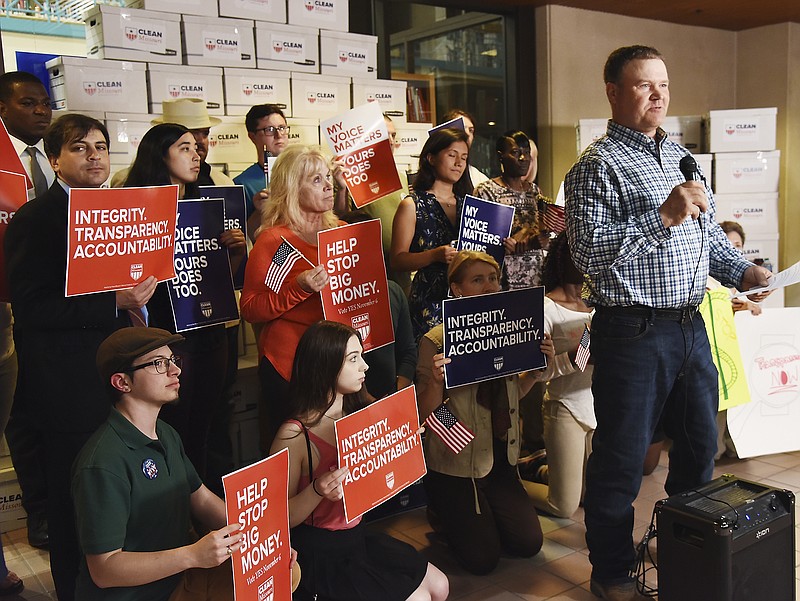Last week, nearly 62 percent of the almost 2.4 million Missouri voters who cast ballots said they wanted the Constitution to be amended by the "Clean Missouri" plan.
Judges ruled in September that Missouri voters had the right to decide if the proposed should be adopted. However, the courts didn't say opponents were barred forever from challenging the amendment, if it passed.
With the amendment's passage, Kansas City lawyer Eddie Greim said Monday: "All options are on the table. We suspect an even greater majority of Missourians would vote to reject the redistricting portion of Clean Missouri if the ballot gives them a fair chance to do so."
Sean Soendker Nicholson, who led the initiative petition campaign placing the issue on the ballot, said in late September the plan, if passed, would "eliminate almost all lobbyist gifts in the General Assembly; require that legislative records be open to the public; lower campaign contribution limits for state legislative candidates; require politicians to wait two years if they want to become lobbyists; (and) ensure that neither political party is given an unfair advantage when new maps are drawn after the next census."
Business leaders, and some Republican leaders, objected to various parts of the amendment, and filed two lawsuits that were tried in Cole County by Circuit Judge Dan Green, and ruled on by the state appeals court in Kansas City.
Most of the opponents' objections focused on the amendment's redistricting plan, which keeps parts of the current system but, the opponents argued, gives the main power to redraw state legislative districts to a non-partisan "state demographer," who is to be chosen by the state auditor with approval from the Senate's majority and minority party leaders.
The Clean Missouri amendment says, after the federal government reports the results of its every 10-year Census, that demographer (and his or her staff) are to draw the new district lines based on clear criteria including being compact and contiguous (which are the current constitutional requirements), as well as having natural and political boundaries, keeping communities' interests, and fairness and political competitiveness.
Opponents, including Missouri's Republican Party, complained that puts too much power in the auditor's office - which currently is held by Nicole Galloway, the only statewide Democrat.
Currently, when legislative districts need to be redrawn every 10 years, to reflect changes in Missouri's population, the governor names two commissions comprised of residents recommended by the congressional district committees of the two largest political parties - and those commissions redraw the district boundaries based on population data and statutory requirements.
Under the amendment, those two commissions still must be formed and must approve the demographer's proposed district boundaries by at least a 70 percent margin.
The two lawsuits filed in August, right after Secretary of State Jay Ashcroft certified the proposed amendment to be on last week's ballot, accused the Clean Missouri supporters of using the proposed amendment's other, "ethics"-related provisions to cover up the redistricting plan as the amendment's main goal.
Those other provisions included the lobbyist gift and campaign donations limits and the two-year ban on lawmakers becoming lobbyists.
Greim said Monday, "There are also First Amendment problems with other parts of Clean (Missouri) that were not well-conceived and were added to distract voters.
"The question for now is how to fix Clean (Missouri), a move that we think will likely be even more popular than Clean itself."
He didn't provide details and didn't say if another lawsuit was being planned.
Officials with the Missouri Chamber of Commerce and Industry and the Missouri Republican Party could not be reached Monday for a comment for this story.

